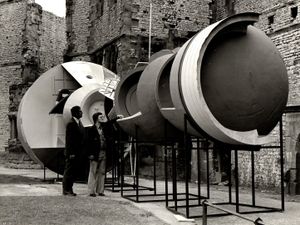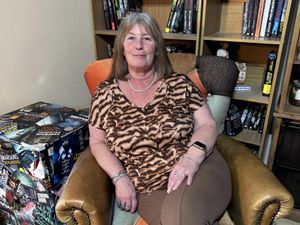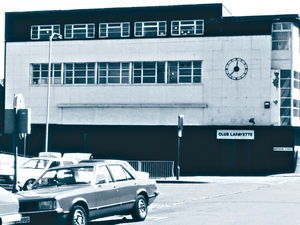Meet the team dedicated to showing off Wolverhampton's history
They are the dedicated team of volunteers helping to celebrate Wolverhampton's proud history and bring it to life for younger generations.
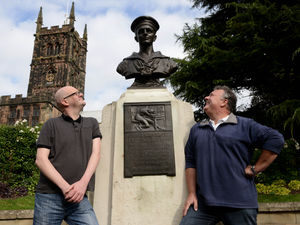
From installing blue plaques commemorating achievements and landmarks to hosting a wide range of insightful talks and events, the Wolverhampton Society aims to showcase the city's rich cultural heritage.
But members are also working to dispel the myth that Wolverhampton has lost much of its historic architecture over the years and want to encourage people to take a closer a look at their home town.
"As someone who has lived here for 37 years, I've often heard people say there is nothing in Wolverhampton and that all the old buildings have gone.
"But there are so many buildings still in the city that if you know their history, you understand why they are significant.
"We have lost a lot of buildings over the years but that doesn't mean there's not a lot still here.
"Our mission is to get the word out there and encourage people to find their stories," says the society's publicity officer and history graduate Andy Sloane.
"It's like a treasure chest, you just have to lift the lid and dive in," adds society secretary Quintin Watt.
"You've got to open your eyes in Wolverhampton and look above the shops to see the original buildings," says the retired history teacher.
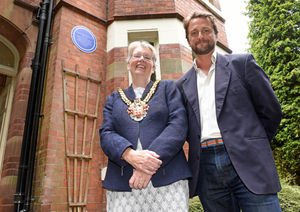
It only takes a little bit of digging to uncover interesting stories about the city's past including a tale about boxer Joe Goss who moved to the city after visiting the Whitsuntide fair, says Andy.
"I have a subscription to the British Newspaper Archive and found a tit-bit about a boxer who lived in Wolverhampton and was the heavyweight champion of the world at the end of the 19th century.
"Nobody had heard of him because he moved to America but he ran the Saracens Head pub here and when he moved to Boston he also ran a pub also called the Saracens Head.
"There's lots of stories out there, you just have to do a little research. Another one is that Lawrence of Arabia used to drink in Wolverhampton.
"He could come here, talk about football, drink tea and no one would bat an eyelid," he explains.
The Wolverhampton Society, which has 80 members, oversees two long-running groups - the Wolverhampton Civic and Historical Society (WCHS) and Wolverhampton Literary and Scientific Society (WLSS).
It was formed earlier this year in a bid to secure their future by boosting membership and increasing the programme of talks and events.
It will include its first Christmas lecture on December 9 which will be talk on the 50th anniversary of the Apollo moon landing by historian Andrew Lound.
Andy says: "The two societies have traditionally appealed to the older generations but to keep them going we need to attract younger people and so we are looking at we can do to engage with younger people."
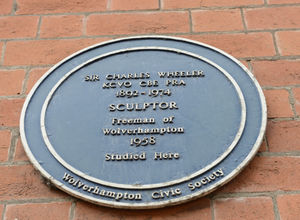
This has included starting to build links with the university's science and history departments and looking at what they can offer school groups.
One well-known side to the society's work is the issuing of blue plaques honouring important achievements by individuals and companies, as well as places where something of historical importance occurred.
The first blue plaque was installed in 1983 and honoured Express & Star founder Thomas Graham.
Since then more than 100 have been installed across the city with the most recent in tribute to Baroness Rachael Heyhoe Flint, best known for her time playing cricket for England, and as the vice-president of Wolves.
Future plaques including one for the John Williams & Son trap makers in Wednesfield and one commissioned by the Nurses Trust for the Royal Hospital site.
"We always welcome suggestions for blue plaques and they will be discussed by the committee," says Quintin.
The Wolverhampton Society is also working on its first full-length publication on the First World War titled Wolverhampton’s Great War 1914-1921.
Among the stories featured in the book being written by local authors and edited by Quintin is that of brave sailor Able Seaman Douglas Harris.
Born in 1898 in Penn, Able Seaman Harris worked as a baker before signing up join the Royal Navy for fight for his country.
He was stationed on HMS Admirable before his good communication skills led to him being drafted in Italian drifter Floandi as a wireless operator. On the night of May 14, 1917, Floandi came under heavy attack in the Adriatic Sea from the Austrian Navy.
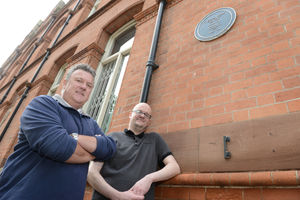
He stuck to his post in the wireless room on the crippled drifter and continued to send messages and make entries in his log until he was hit and killed by a piece of shrapnel.
Able Seaman Harris was later awarded one of the Italian Navy’s Highest Awards for bravery, although he was never officially honoured by his own country.
But the people of Wolverhampton did not forget him and in honor of his actions a memorial, which now stands in St Peter's Gardens was paid for by public subscription.
"I think they wanted the memorial because he was never officially recognised. He died during a debacle for the Navy and they didn't commemorate those. If he had died during one of the famous battles he would have been officially honoured.
"Able Seaman Harris' log book that he was found slumped upon was sent back to Wolverhampton four or five weeks after the battle and thousands of people came to see it at the art gallery.
"It was then donated to the Imperial War Museum but we don't know where it is now," says Quintin.
The book, which is the first known attempt to produce a history of Wolverhampton during the war,is due to be published later in the autumn.
Meanwhile future talks include Iron, Coal and Roses - the story of a family of Black Country ironmasters - on September 24 and A History of Goodyear on October 29.

Society membership costs £15 but guests are most welcome to attend the talks at a cost of £2 on the door.
"It's a way to meet new people and get out of the house. For £2 what have they got to lose," says Andy.
For further information email enquiries@wolverhamptonsociety.com or see wolverhamptonsociety.com


